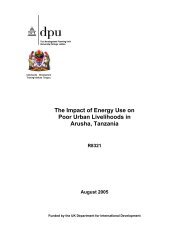EPA Review Annex Documents - DFID
EPA Review Annex Documents - DFID
EPA Review Annex Documents - DFID
You also want an ePaper? Increase the reach of your titles
YUMPU automatically turns print PDFs into web optimized ePapers that Google loves.
3. Quantification of costs of counterfactual negotiations<br />
The EBA is a unilateral offer by the EU which does not hold any binding commitment. It is argued<br />
by some that the danger remains that if the EU withdraws the offer at any point and they could<br />
advise countries like Ethiopia (non-WTO members) to give prior attention in concluding the <strong>EPA</strong>.<br />
However, others argue that, though the EBA seems a unilateral offer, in reality it is the result of a<br />
multilateral commitment that all developed and developing countries including the EU, committed<br />
to extend Duty-Free-Quota-Free (DFQF) market access to all LDCs, whether WTO or non-WTO<br />
members. Therefore, withdrawal of the EBA seems remote. Moreover, there will be moral onerous<br />
on the EU if it tries to deny such preferences to poor LDCs like that of Ethiopia merely for not<br />
being WTO member.<br />
Second and most important is that, though not clearly stated as “EBA” in the Cotonou Agreement,<br />
Article 37 (9) offers similar preference like that of the EBA. 105 Therefore one can conclude that<br />
even though the EBA seems to be a unilateral offer, it is actually an offer provided as a result of<br />
an agreement.<br />
In fact for Ethiopia, the impact does not have any difference. Firstly, the duty of main export of<br />
Ethiopia to the EU are either already 0% or are covered under the GSP DFQF Preference.<br />
Secondly it is arguable that the EBA is covered under the Cotonou. Therefore, there was no<br />
specific pressure to negotiate the <strong>EPA</strong> or acceding to the WTO.<br />
However, Ethiopia voluntarily decided to rigorously negotiate the <strong>EPA</strong> with EC rather than<br />
entirely rely on the unilateral EBA/GSP offered at the goodwill of the EU.<br />
For Ethiopia, the motive and driving force to negotiate <strong>EPA</strong> (and continues to be) overriding<br />
trade and/or market access that they may get from this envisioned <strong>EPA</strong>, was the promise and<br />
potential benefits clearly stated on the Cotonou Agreement. Article 34-37 of the Cotonou<br />
Agreement clearly states the objectives, principles, modalities and procedures of the Economic<br />
Partnership Agreement.<br />
Box-1:- Objectives, Principles, Modalities and Procedures of the <strong>EPA</strong><br />
Article-34, Objectives states that;<br />
• … aim at fostering the smooth and gradual integration of the ACP States into<br />
the world economy, with due regard for their political choices and<br />
development priorities, thereby promoting their sustainable development and<br />
contributing to poverty eradication in the ACP countries,<br />
• … to play a full part in international trade…. to participate actively in<br />
multilateral trade negotiations, … aim at enhancing the production, supply<br />
and trading capacity of the ACP countries as well as their capacity to attract<br />
investment.<br />
Under ARTICLE 35, Principles it is stated that;<br />
• … shall build on regional integration initiatives of ACP States, bearing in mind<br />
that regional integration is a key instrument for the integration of ACP<br />
countries into the world economy,<br />
• … shall take account of the different needs and levels of development of the<br />
105 Article 37 (9) “…at the latest 2005 will allow duty free access for essentially all products from all LDC<br />
building on the level of the existing trade provisions … that apply to their exports”<br />
104
















